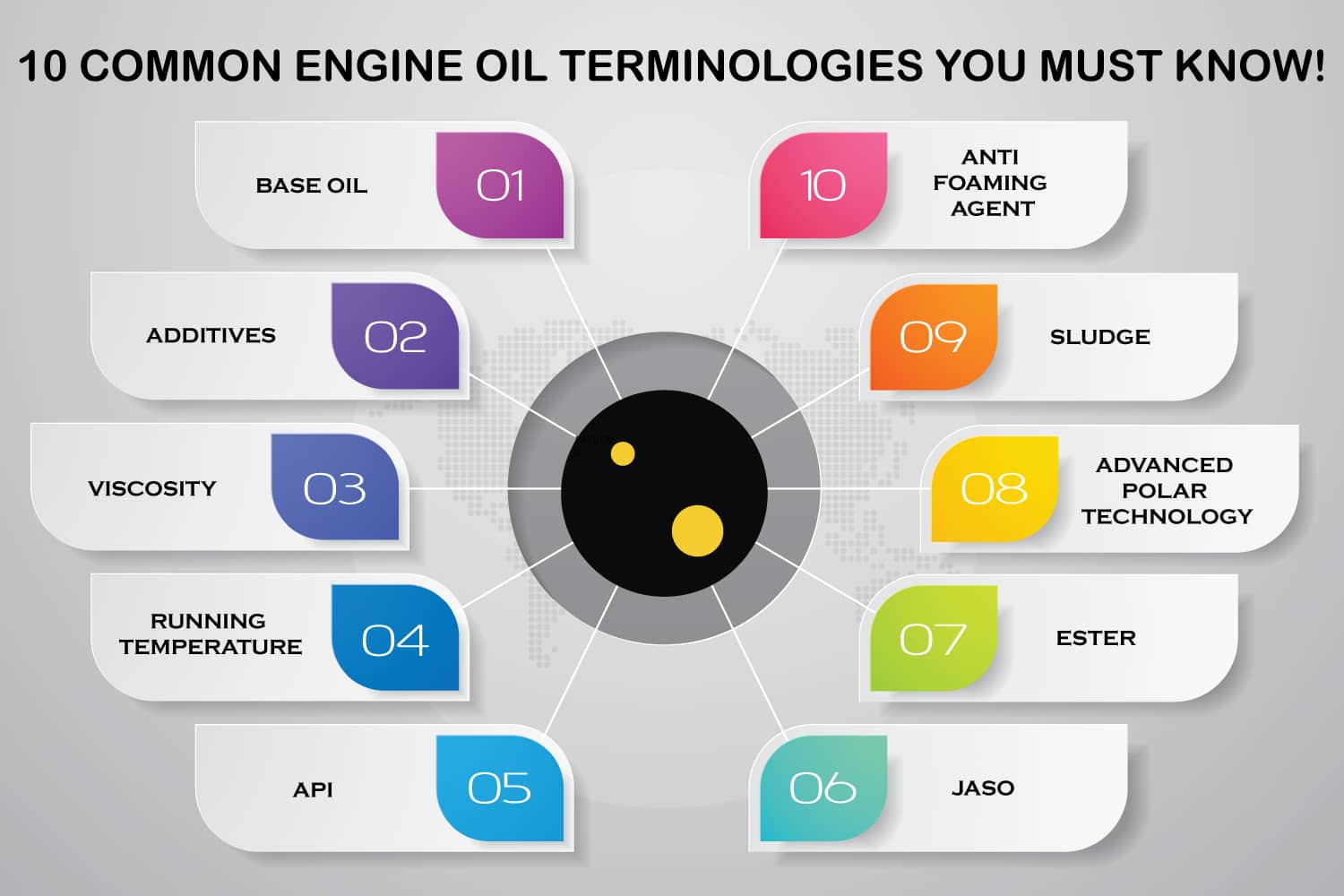10 common Engine Oil Terminologies you must know!
The working of any automation is a complicated process, especially when it comes to internal parts like engines.
However, lack of basic knowledge about the engine can harm the average car or motorbike user and incur losses through damage, wear and tear, servicing costs, etc.
Engine oils are essential in ensuring the optimum functioning of a vehicular engine and understanding the various components and uses of engine oils can help vehicle users avoid basic pitfalls in the car of their car or bike.
Here are 10 common engine oil terminologies that can be useful in caring for your vehicle:

Base Oil
Base oil is an essential component for most types of lubricants. It is basically refined crude oil into which additives are mixed to obtain different types of lubricants. Grease, different grades of engine oil, specialised lubricating oils, metal processing fluids, etc. are all made up from base oil.
According to the American Petroleum Institute (API), base oils are grouped into five categories based on the refining methods used and the base oil’s properties like viscosity, sulfur content, etc.
Additives
In order to create the different types of oils and lubricants used in machinery and vehicles, certain additives need to be added to base oils.
These additives are external chemical compounds that determine various properties of the final oil, such as lubrication, viscosity, protection, wear and tear resistance, etc.
Some common additives used are antioxidants, rust and corrosion inhibitors, viscosity index improvers, anti-wear agents, detergents, anti-foaming agents, dispersants, etc.
Viscosity
Viscosity of engine oil is a property that can affect the oil’s performance.
Basically viscosity is the thickness of the engine oil, which is variable based on the temperature as well as the speed and wear and tear of the vehicle.
It refers to the ease with which the oil can flow at specified conditions. Generally, oils tend to be more viscous at lower temperatures and less viscous at hotter temperatures.
So, thin oils are preferred in the cold while thick oils are used in the heat. The various grades of engine oil are determined primarily on the viscosity of the oil.
Running Temperature
As discussed previously, the temperature outside as well as inside the engine affects the performance of engine oils, due to variability of the viscosity. Running temperature refers to the optimum temperature of the engine oil at a certain load.
Most experts agree that an engine should run between 75 to 105 degrees Celsius for optimum functioning. However, this figure is variable according to the types, designs and uses of the engine.
API (American Petroleum Institute)
The American Petroleum Institute or API is an U.S based trade association for the oil and natural gas industry. The API was formed in 1919 and has been a leader in the oil and natural gas industry since then.
It’s chief functions are advocacy, negotiation, lobbying with various legal and regulatory agencies, research into various aspects of petroleum, establishment of industry standards like oil grades, as well as educational outreach.
JASO (Japanese Automotive Standards Organisation)
The JASO is a Japanese organisation that sets automotive standards in Japan for various aspects of automotive engineering like grades for engine oils.
JASO grades for oils are different from American ones since Japanese engines require oils of differing specifications and properties.
The highest oil grade for two-stroke engines is JASO FD and for four-stroke engines, it is the JASO MA.
Ester
Engine oils come in different types such as mineral oil, semi-synthetic and synthetic oil. Ester is a variation of the generic synthetic oil. Esters are collected from natural sources and then synthesised in much smaller quantities than regular synthetic oil.
At a given temperature and viscosity, esters are much less volatile than regular and base oils, which makes them preferable. Furthermore, they attract and stick to metal without leaving deposits in the engine.
Advanced Polar Technology
Advanced Polar Technology or APT is a recent path breaking technology that has been developed in the automotive industry. This technology is essentially an engine oil that is infused with negatively charged electrons.
This oil therefore, is better at sticking to the car engine and thus provides superior protection from wear and tear. Today, with further research, this technology is being continuously modified to make it better.
Sludge
A car engine that is used regularly is bound to see some wear and tear. The formation of black, tar-like substance called sludge in the engine is the result of this wear and tear.
Sludge is usually the result of various processes that take place in an engine, such as oxidation, moisture, external contaminants, etc. The sludge is a sticky black gel like substance that sticks to engine parts and hampers its functioning.
This can be avoided by regularly changing engine oils, as well as cleaning and servicing the engine.
Anti Foaming Agent
Talking about Engine Oil Terminologies, we cannot miss anti foaming agent. An anti-foaming agent is one of the commonly added additives in engine oils. This type of agent reduces the formation of foam in engine oil.
Generally, agitation or aeration of engine oil may cause the formation of foam or air bubbles, which in turn accelerates the process of oil oxidation and decreases the lubrication.
Foaming hampers the optimum functioning of the oil, which is why external anti-foaming additives can help maintain its superior quality. Common anti foaming agents are insoluble oils, silicones, glycols and certain alcohols.

